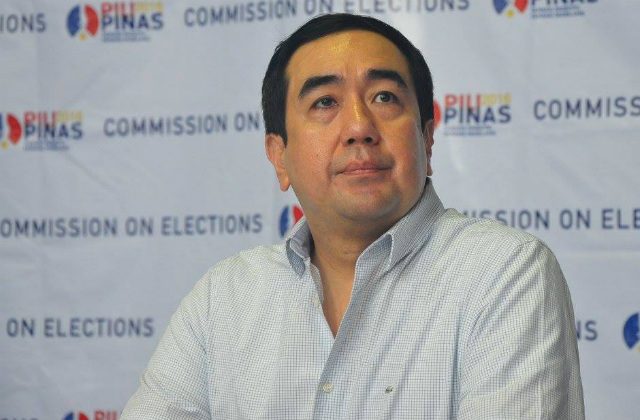SUMMARY
This is AI generated summarization, which may have errors. For context, always refer to the full article.

Did President Rodrigo Duterte overstep his constitutional powers when he deemed Commission on Elections (Comelec) chairman Andy Bautista resigned “effective immediately”?
By saying his resignation is effective earlier than the December 31 date mentioned by the former poll chief, did Duterte in effect, fire Bautista, which he is not allowed to do under the 1986 Constitution? This was the question raised by some lawyers, considering that Bautista, as head of a constitutional commission, can be removed only via impeachment.
In his October 11 letter to Duterte, Bautista clearly said his resignation would take effect only on December 31.
“Due to personal reasons, I am tendering my resignation as chairman of the Commission on Elections effective December 31, 2017,” reads Bautista’s letter to Duterte.
“The approximate 10-week period is meant to provide you, Mr President, sufficient time to choose my replacement as well as ensure a smooth and orderly transition within the Commission,” Bautista explained. There was no indication in the letter that Bautista gave Duterte the leeway to decide whether or not to deem his resignation effective earlier than December 31.
The act of characterizing Bautista’s resignation as taking effect immediately might be construed as an indirect way of removing an impeachable officer, according to one lawyer.
If Bautista had revised his letter to say his resignation could be treated as “effective immediately’ or at any point to be decided upon by the President, it would have left no doubt about Duterte’s actions. But Executive Secretary Salvador Medialdea countered that by tendering his resignation, Bautista “voluntarily placed himself at the disposal of the President.”
“The period until December 31 was a favor intended for the President, to enable him to choose a suitable replacement, not for Bautista’s benefit. Being a mere favor, it may be waived by the intended beneficiary,” he told Rappler.
Some lawyers agree with Medialdea, some do not.
Former solicitor general Florin Hilbay said that Duterte “cannot dictate or amend the terms of his resignation” – whether or not he is an impeachable official.
“Chair Bautista must formally accede to the imposition because there’s a bureaucratic process involved,” Hilbay told Rappler.
But since Bautista said in his press conference that he accepts Duterte’s decision, he lost his chance to keep his preferred timeline. “He effectively waived his right to insist on the terms of his resignation,” said Hilbay.
Another lawyer said that since Bautista accepted Duterte’s decision, he, in effect, amended his resignation letter.
Whatever the different arguments, Bautista has said he has no problems resigning earlier than scheduled.
After the President’s acceptance of Bautista’s resignation, the House of Representatives’ discussions on the articles of impeachment were not held on Tuesday, October 24, as planned. (READ: House impeaches Comelec Chairman Andres Bautista)
The impeachment trial is considered moot since the position of Comelec chairman is now vacant. The House will no longer be forwarding the articles of impeachment to the Senate. And that’s the final word on Bautista’s threatened impeachment. – Rappler.com
Add a comment
How does this make you feel?
There are no comments yet. Add your comment to start the conversation.